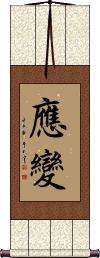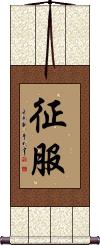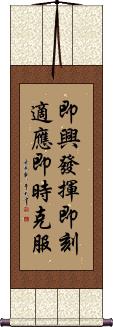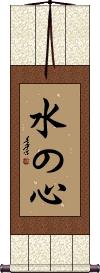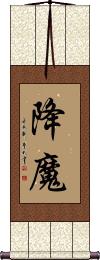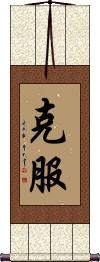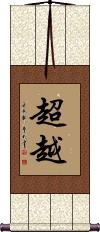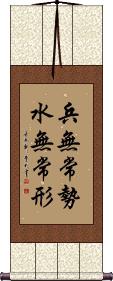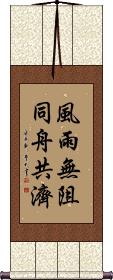Many custom options...
And formats...

Overcome in Chinese / Japanese...
Buy an Overcome calligraphy wall scroll here!
Personalize your custom “Overcome” project by clicking the button next to your favorite “Overcome” title below...
4. Use Hard Work to Overcome Adversity
6. Indomitable Spirit / Indomitable Attitude
9. Overcome
10. Overcome / Surpass / Rise Above
11. Undaunted After Repeated Setbacks
12. Resilient in the Face of Adversity
13. Warriors Adapt and Overcome
14. Overcome: Regardless of the Rain and Wind
15. Regardless of the Weather, We Overcome Troubles Together
Ability to Adapt
Adapt Oneself
應變 means “to meet a contingency,” “to adapt oneself to changes,” or “to adapt to changes” in Chinese.
It's also used in Japanese but usually only in the context of Buddhism. 應變 is probably the shortest way to express the idea of adapting and overcoming whatever circumstances present themselves.
Conquer / Conquest
征服 means to conquer or conquest in Chinese, Japanese Kanji, and old Korean Hanja.
This can also be translated as vanquish, to subdue, subjugation, overcoming, or, to strike.
Note: This is kind of a violent term for a wall scroll but if you really want it, we’ll make it custom for you.
Use Hard Work to Overcome Adversity
Improvise Adapt Overcome
即興發揮即刻適應即時克服 is the coolest way to put together this famous word list, “Improvise Adapt Overcome.”
There are shorter ways to write “adapt,” and “overcome,” but “improvise” needs a four-character word to be expressed accurately in Chinese. To match them up, the other two are using four-character words as well. This makes it sound more natural in Chinese (though word lists are not a natural construct in Chinese grammar).
The words break down like this: 即興發揮, 即刻適應, 即時克服. I suggest the 3-column option when you customize your wall scroll. That way, the words will occupy one column each.
A great gift for a U.S. Marine, or anyone who follows this mantra.
Indomitable Spirit / Indomitable Attitude
Fukutsu no Seishin
Mind Like Water
Mizu No Kokoro
水の心 is the Japanese Buddhist and martial arts phrase, “Mizu no Kokoro,” which means “mind like water” or “heart of water.”
The phrase is a metaphor describing the pond that clearly reflects its surroundings when calm but whose images are obscured once a pebble is dropped into its waters.
Overcome the Devil
降魔 means to overcome the Devil, Satan, Demons, or Evil.
There are many ways to translate this, including conquering the devil, evil spirits, evil influences, or someone who habitually performs negative/evil acts.
In the Buddhist context, it means to overcome demons, e.g., as the Buddha did at his enlightenment.
Overcome
Overcoming Hardships
In Chinese, Japanese Kanji, and old Korean Hanja, 克服 means “overcome” (as in overcoming hardships, etc.). It can also mean to conquer, to put up with, or to endure.
This can be a conquest over a problem, disease, handicap, poverty, or illness. Other definitions include overcoming, bringing under control, subjugation, or victory over something.
This can be used as an inspirational wall scroll to remind someone to try to overcome difficulties that may arise in life.
Overcome / Surpass / Rise Above
In Chinese, Japanese Kanji, and old Korean Hanja, 超越 means to overcome, surpass, transcendence, excel, exceed, go beyond, rise above, or transcend.
Undaunted After Repeated Setbacks
Persistence to overcome all challenges
百折不撓 is a Chinese proverb that means “Be undaunted in the face of repeated setbacks.”
More directly translated, it reads, “[Overcome] a hundred setbacks, without flinching.” 百折不撓 is of Chinese origin but is commonly used in Japanese and somewhat in Korean (same characters, different pronunciation).
This proverb comes from a long, and occasionally tragic story of a man that lived sometime around 25-220 AD. His name was Qiao Xuan, and he never stooped to flattery but remained an upright person at all times. He fought to expose the corruption of higher-level government officials at great risk to himself.
Then when he was at a higher level in the Imperial Court, bandits were regularly capturing hostages and demanding ransoms. But when his own son was captured, he was so focused on his duty to the Emperor and the common good that he sent a platoon of soldiers to raid the bandits' hideout, and stop them once and for all even at the risk of his own son's life. While all of the bandits were arrested in the raid, they killed Qiao Xuan's son at first sight of the raiding soldiers.
Near the end of his career, a new Emperor came to power, and Qiao Xuan reported to him that one of his ministers was bullying the people and extorting money from them. The new Emperor refused to listen to Qiao Xuan and even promoted the corrupt Minister. Qiao Xuan was so disgusted that in protest, he resigned from his post as minister (something almost never done) and left for his home village.
His tombstone reads “Bai Zhe Bu Nao” which is now a proverb used in Chinese culture to describe a person of strong will who puts up stubborn resistance against great odds.
My Chinese-English dictionary defines these 4 characters as “keep on fighting despite all setbacks,” “be undaunted by repeated setbacks,” and “be indomitable.”
Our translator says it can mean “never give up” in modern Chinese.
Although the first two characters are translated correctly as “repeated setbacks,” the literal meaning is “100 setbacks” or “a rope that breaks 100 times.” The last two characters can mean “do not yield” or “do not give up.”
Most Chinese, Japanese, and Korean people will not take this absolutely literal meaning but will instead understand it as the title suggests above. If you want a single big word definition, it would be indefatigability, indomitableness, persistence, or unyielding.
See Also: Tenacity | Fortitude | Strength | Perseverance | Persistence
Resilient in the Face of Adversity
打たれ強い is often used as a martial arts term.
It means being able to take a lot of punishment or being able to take a hit. In Japanese baseball, it can also refer to the pitcher's ability to keep his cool when the batter gets a hit. 打たれ強い is generally about being resilient and strong in the face of criticism or adversity.
Note: Because this selection contains some special Japanese Hiragana characters, it should be written by a Japanese calligrapher.
Warriors Adapt and Overcome
Soldiers need a fluid plan
This literally translates as: Troops/soldiers/warriors have no fixed [battlefield] strategy [just as] water has no constant shape [but adapts itself to whatever container it is in].
Figuratively, this means: One should seek to find whatever strategy or method is best suited to resolving each individual problem.
This proverb is about as close as you can get to the military idea of “adapt improvise overcome.” 兵無常勢水無常形 is the best way to express that idea in both an ancient way, and a very natural way in Chinese.
Overcome: Regardless of the Rain and Wind
風雨無阻 is a proverb that is often translated as “Go ahead as planned regardless of the weather” or, “[Overcome] despite the rain and wind.”
This is a Chinese proverb that suggests that you are willing (or should be willing) to overcome any adversity, and accomplish your task at hand.
There is a second/optional part to this phrase that suggests that you should do this together with someone (see our other 8-character version if you want the full phrase).
Regardless of the Weather, We Overcome Troubles Together
The first four characters are often translated as “Go ahead as planned regardless of the weather” or, “[Overcome] despite the rain and wind.” The last four characters can mean “Stick together” but literally means “Take the same boat [together].”
風雨無阻同舟共濟 is a Chinese proverb that suggests that you are willing (or should be willing) to overcome any adversity, and accomplish your task at hand. The second part (last four characters) is sometimes left off but this second part strongly suggests that you should overcome that adversity together.
The following table may be helpful for those studying Chinese or Japanese...
| Title | Characters | Romaji (Romanized Japanese) | Various forms of Romanized Chinese | |
| Ability to Adapt | 応変能力 | ouhen nouryoku ouhennouryoku ohen noryoku | ||
| Adapt Oneself | 應變 应变 | ou hen / ouhen / o hen | yìng biàn ying4 bian4 ying bian yingbian | ying pien yingpien |
| Conquer Conquest | 征服 | sei fuku / seifuku | zhēng fú / zheng1 fu2 / zheng fu / zhengfu | cheng fu / chengfu |
| Use Hard Work to Overcome Adversity | 刻苦耐勞 刻苦耐劳 | kè kǔ nài láo ke4 ku3 nai4 lao2 ke ku nai lao kekunailao | k`o k`u nai lao kokunailao ko ku nai lao |
|
| Improvise Adapt Overcome | 即興發揮即刻適應即時克服 即兴发挥即刻适应即时克服 | jí xìng fā huī jí kè shì yìng jí shí kè fú ji2 xing4 fa1 hui1 ji2 ke4 shi4 ying4 ji2 shi2 ke4 fu2 ji xing fa hui ji ke shi ying ji shi ke fu | chi hsing fa hui chi k`o shih ying chi shih k`o fu chi hsing fa hui chi ko shih ying chi shih ko fu |
|
| Indomitable Spirit Indomitable Attitude | 不屈の精神 | fu kutsu no sei shin fukutsunoseishin | ||
| Mind Like Water | 水の心 | mizu no kokoro mizunokokoro | ||
| Overcome the Devil | 降魔 | gou ma / gouma / go ma | xiáng mó / xiang2 mo2 / xiang mo / xiangmo | hsiang mo / hsiangmo |
| Overcome | 克服 / 剋服 克服 | koku fuku / kokufuku | kè fú / ke4 fu2 / ke fu / kefu | k`o fu / kofu / ko fu |
| Overcome Surpass Rise Above | 超越 | chou etsu / chouetsu / cho etsu | chāo yuè / chao1 yue4 / chao yue / chaoyue | ch`ao yüeh / chaoyüeh / chao yüeh |
| Undaunted After Repeated Setbacks | 百折不撓 百折不挠 | hyaku setsu su tou hyakusetsusutou hyaku setsu su to | bǎi zhé bù náo bai3 zhe2 bu4 nao2 bai zhe bu nao baizhebunao | pai che pu nao paichepunao |
| Resilient in the Face of Adversity | 打たれ強い | u ta re tsuyo i utaretsuyoi | ||
| Warriors Adapt and Overcome | 兵無常勢水無常形 兵无常势水无常形 | bīng wú cháng shì shuǐ wú cháng xíng bing1 wu2 chang2 shi4 shui3 wu2 chang2 xing2 bing wu chang shi shui wu chang xing | ping wu ch`ang shih shui wu ch`ang hsing ping wu chang shih shui wu chang hsing |
|
| Overcome: Regardless of the Rain and Wind | 風雨無阻 风雨无阻 | fēng yǔ wú zǔ feng1 yu3 wu2 zu3 feng yu wu zu fengyuwuzu | feng yü wu tsu fengyüwutsu |
|
| Regardless of the Weather, We Overcome Troubles Together | 風雨無阻同舟共濟 风雨无阻同舟共济 | fēng yǔ wú zǔ tóng zhōu gòng jì feng1 yu3 wu2 zu3 tong2 zhou1 gong4 ji4 feng yu wu zu tong zhou gong ji fengyuwuzutongzhougongji | feng yü wu tsu t`ung chou kung chi feng yü wu tsu tung chou kung chi |
|
| In some entries above you will see that characters have different versions above and below a line. In these cases, the characters above the line are Traditional Chinese, while the ones below are Simplified Chinese. | ||||
Successful Chinese Character and Japanese Kanji calligraphy searches within the last few hours...

